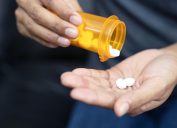4 Common OTC Meds You May Have Trouble Finding on Shelves Right Now
COVID-19 and supply chain disruptions might make these popular drugs hard to find.

While shortages of certain foods and other products can be disconcerting, it's downright worrisome when medicines are in short supply. The U.S. Federal Drug Administration (FDA) explains why this happens: "Drug shortages are caused by many factors, including difficulties in acquiring raw materials, manufacturing problems, regulatory issues, and business decisions, as well as many other disturbances within the supply chain."
These other factors can be as simple as a sudden increased demand, which may happen due to things like allergy or flu season, but COVID has added to that sense of urgency, due to both supply chain issues—such as with the alarming 2022 baby formula shortage—and because the virus causes symptoms that necessitate over-the-counter (OTC) meds.
If the past two-and-a-half years—and the continuing disruption of supplies around the world—are any indicator, we could be facing shortages of popular OTC drugs. Read on to find out which ones you may have trouble finding at your local pharmacy in the coming weeks and months.
READ THIS NEXT: This Major Medication Shortage Has Patients "Scared," New Report Says.
1
Lozenges and gargles

One of the hallmarks of COVID is a sore throat, so it makes sense that people are snatching up throat-soothing lozenges and gargles. "The surge in sales of cough drops is thanks to three factors: a loosening of restrictions and return to normal socialization, a global surge in the highly contagious omicron variant, and its symptoms that are more akin to a traditional cold or flu compared to earlier strains," Bloomberg reports.
In case you're wondering, "lozenge tablets and cough drops are the same and have similar functions," according to Quantum Health, which notes that both are recommended for sore throats and coughs. However, "although cough drops and lozenges are almost identical, they contain different (percentage) ingredients and work differently." If you don't have either, but a cough is bothering you, you can try some simple alternatives, such as honey.
READ THIS NEXT: If You Get Meds From CVS or Walgreens, Be Prepared for This Shortage.
2
Allergy medications

It may seem like your spring allergies immediately became fall allergies (although you should always consider the idea that your allergies could be caused by something in your home), but there are different peak time periods throughout the year for seasonal allergy sufferers. "Tree pollen pops up in the spring (generally in late March to April), grass pollen arrives in the late spring (around May), while weed pollen is most prevalent in the summer (July to August) and ragweed pollen takes over from summer to fall (late August to the first frost)," Purvi Parikh, MD, told Women's Health.
That means the fall 2022 pollen count is reaching its peak now. Unfortunately, it also means that OTC allergy meds may be in short supply—especially when the season is "intense," reported Fox5 DC. "If you're suffering you may face even more challenges finding medicine," said the site.
3
Cold and flu medications

At the beginning of the year, Fox29 Philadelphia reported issues with certain popular OTC medications. "Experts say ongoing supply chain problems that have stymied shipments in other departments have combined with the seasonal flu season and the spike in Omicron to create a shortage in cold and flu medicine," the site reported.
"There are going to be probably ongoing outages for quite a while in very specific different spots here and there throughout the supply chain," Supply chain expert James Crean told the news outlet.
For more health news sent directly to your inbox, sign up for our daily newsletter.
4
Pain relievers

Drugs aimed at treating the aches and pains of seasonal illness can also be in high demand and therefore hard to find. Back in 2020, Reuters reported that Johnson & Johnson was manufacturing Tylenol "at maximum capacity in North America to meet surging demand due to the fast-spreading coronavirus outbreak," which led to a shortage of the drug. The approaching cold and flu season—as well as the fact that the national COVID-19 rate is high, with omicron subvariants like BA.5 circulating—may mean another rush to purchase pain relievers like Tylenol.
In Canada, this is currently true for children's pain relievers. "Many pharmacies… are rationing stock by limiting per-customer purchases and putting children's medications containing acetaminophen and ibuprofen—such as liquid and chewable products by Tylenol and Advil—behind the counter to prevent bulk buying," reported the Toronto Star. Danielle Paes, chief pharmacist officer at the Canadian Pharmacists Association, told the Star that the increased demand has been "specifically fueled by high levels of virus activity," not just from COVID but other viruses as well. "It is back-to-school season and so that's adding to it," said Paes.
Best Life offers the most up-to-date information from top experts, new research, and health agencies, but our content is not meant to be a substitute for professional guidance. When it comes to the medication you're taking or any other health questions you have, always consult your healthcare provider directly.





















